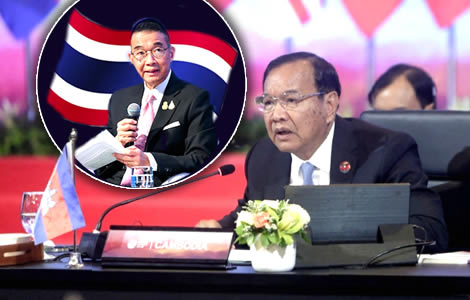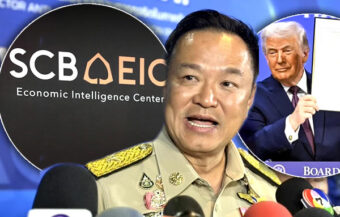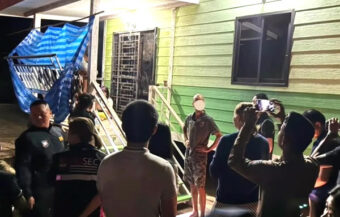Cambodian FM urges Thailand to settle border dispute at The Hague’s ICJ in advance of June 14th Joint Border Commission (JBC) meeting. Thailand refuses to accept ICJ jurisdiction, deepening tensions as both sides face ongoing clashes and a tense standoff along the border.
At the core of the simmering dispute between Thailand and Cambodia, and indeed talks at the Joint Border Commission (JBC) in Phnom Penh on June 14th, will be Thailand’s refusal to recognise or engage with the International Court of Justice (ICJ). On Friday last, Cambodia’s Minister of Foreign Affairs Prak Sokhon wrote to his Thai counterpart Maris Sengiampongsa calling on Thailand to acquiesce to having the border dispute between the two kingdoms adjudicated by the judges sitting in The Hague. The arbitration of the international body has been rejected by Thailand, which has refused to accept its jurisdiction since 1960.

Cambodian Deputy Prime Minister and Foreign Minister Prak Sokhon has formally urged Thailand to settle their border dispute through the International Court of Justice (ICJ). On June 6, he sent an official letter to Thai Foreign Minister Maris Sengiampong. The letter invites Thailand to jointly refer the long-standing border disagreement to the ICJ, also known as the World Court. This news was reported by Cambodia’s Phnom Penh Post and confirmed by Mr. Chum Sounry, spokesperson for the Cambodian Ministry of Foreign Affairs.
In the letter, Prak Sokhon emphasized that despite many attempts, bilateral talks have failed to solve the issue. Moreover, tensions between the two countries remain high. The letter pointed to several incidents, including the recent violent clash on May 28.
Cambodia cites failed talks and recent violence in border dispute with Thailand, urging legal resolution through ICJ
Of course, it refers to the incident using Cambodian place names. It also alleges that Thai troops opened fire first. This, in turn, contradicts the Thai version of events.
In particular, it specified the firefight as taking place in Tejomorakot village, Morakot sub-district, Chomksan district, Preah Vihear province. During this clash, Thai soldiers, it alleges fired at a Cambodian army base. Tragically, one Cambodian soldier lost his life in the confrontation.
Prak Sokhon stressed that this violent event exposed the urgent need for a peaceful and lasting solution. He said the border dispute’s complexity, long history, and sensitivity make it difficult to resolve through talks alone.
Therefore, Cambodia considers that referring the dispute to the ICJ is the most appropriate path forward. Specifically, Cambodia wants the court to rule on contested areas such as Mombey (also called Chong Bok), Ta Muen Thom, Ta Muen Tod, and Ta Kwai.
Eastern kingdom asks international court to rule on disputed border areas to bring peace and finality
The Cambodian Foreign Minister highlighted that the ICJ’s ruling would be impartial, just and legally binding. He explained that such a ruling would clarify the exact border lines between the two countries.
More importantly, it would promote peace, stability, and long-term cooperation. Prak Sokhon urged the Thai government to join Cambodia in this effort. He asked Thailand to consider the ICJ referral as an opportunity to reaffirm their shared goal of peaceful negotiations.
Furthermore, Prak Sokhon emphasized the importance of resolving disputes through law. He added that both countries should strive to live together as good neighbours in friendship and harmony. This message reflects Cambodia’s desire to avoid future clashes and misunderstandings.
Earlier in the week, Cambodia’s Prime Minister Hun Manet also spoke on the issue. He confirmed Cambodia’s intention to refer the dispute to the ICJ. According to him, bilateral mechanisms have failed to produce clear results.
However, the Prime Minister reassured that areas without serious conflicts will still be managed under the 2001 Memorandum of Understanding between Cambodia and Thailand. This approach balances legal action with ongoing peaceful cooperation where possible.
Pushes for ICJ involvement as border tensions persist, hopes for binding legal clarity between neighbours
The letter and recent statements come amid growing concerns over repeated border tensions.
The May 28 clash is only the latest in a series of incidents that have strained Cambodia-Thailand relations. Therefore, Cambodia’s call for ICJ involvement shows a strong push for a definitive and lasting solution. This legal approach aims to avoid further military incidents and build trust between the two countries.
The disputed areas in question have long been sensitive points. These territories have historic significance and have been the subject of repeated disagreements. Both Cambodia and Thailand claim sovereignty over them. The complexity of these claims makes peaceful resolution difficult without impartial arbitration.
If Thailand agrees to refer the matter to the ICJ, both nations will submit their evidence and legal arguments. The court will then issue a binding judgment based on international law. This ruling should clarify the borderlines once and for all. Subsequently, the countries can work to implement the court’s decision and normalize relations.
Moreover, an ICJ ruling would signal Cambodia’s commitment to international norms. It would show Cambodia’s preference for peaceful, lawful resolution of conflicts. For Thailand, joining this legal process would demonstrate goodwill and a willingness to cooperate. Together, both countries could reduce tensions and promote regional stability.
Cambodia’s call for ICJ arbitration signals shift amid Thailand’s refusal and ongoing border tensions
However, the process will require patience. ICJ cases often take years to conclude. Still, Cambodian diplomats believe it is the best way forward. Continued bilateral talks alone have not resolved the issues. Hence, an impartial legal decision offers the hope of a final settlement.
In the meantime, Cambodia will continue managing other border areas through existing agreements. This dual approach aims to maintain peace on all fronts. By combining ongoing cooperation with legal arbitration, both sides hope to prevent further violence.
Cambodia’s public call for ICJ involvement has already drawn attention from regional and international observers. Many see it as a positive step toward lasting peace in Southeast Asia. It also reinforces the importance of international law in settling territorial disputes.
Thai-Cambodian border tensions left unresolved. Conflict is still on the table as visa periods for nationals are cut
Cambodian troops withdraw from near Chong Bok but questions still remain over this week’s border crisis
Martial law declared in border areas with Cambodia as military takes command of Thailand’s tense standoff
In contrast, Thailand has resolutely ruled out involving the International Court of Justice (ICJ). Indeed, an order was issued by former Prime Minister Srettha Thavisin in 2024, particularly ordering all Thai officials not even to countenance such a move. The kingdom has indeed not recognized the jurisdiction of the international court since 1960.
Nonetheless, Cambodia’s letter to Thailand marks a clear shift toward legal arbitration. Prak Sokhon’s appeal stresses that peaceful, law-based solutions are essential. With the recent deadly clash fresh in memory, the urgency is undeniable. Indeed, an impasse may have been reached which could impact Thai-Cambodian relations moving forward.
Join the Thai News forum, follow Thai Examiner on Facebook here
Receive all our stories as they come out on Telegram here
Follow Thai Examiner here
Further reading:
Dangerous impasse between Thailand and Cambodia as PM rules out International Court of Justice (ICJ)
Hun Manet confirms Cambodia ultimately may decide to send border dispute with Thailand to the Hague
Khmer soldier killed in deadly gunfire between Thai and Cambodian armies near Ubon Ratchathani


















